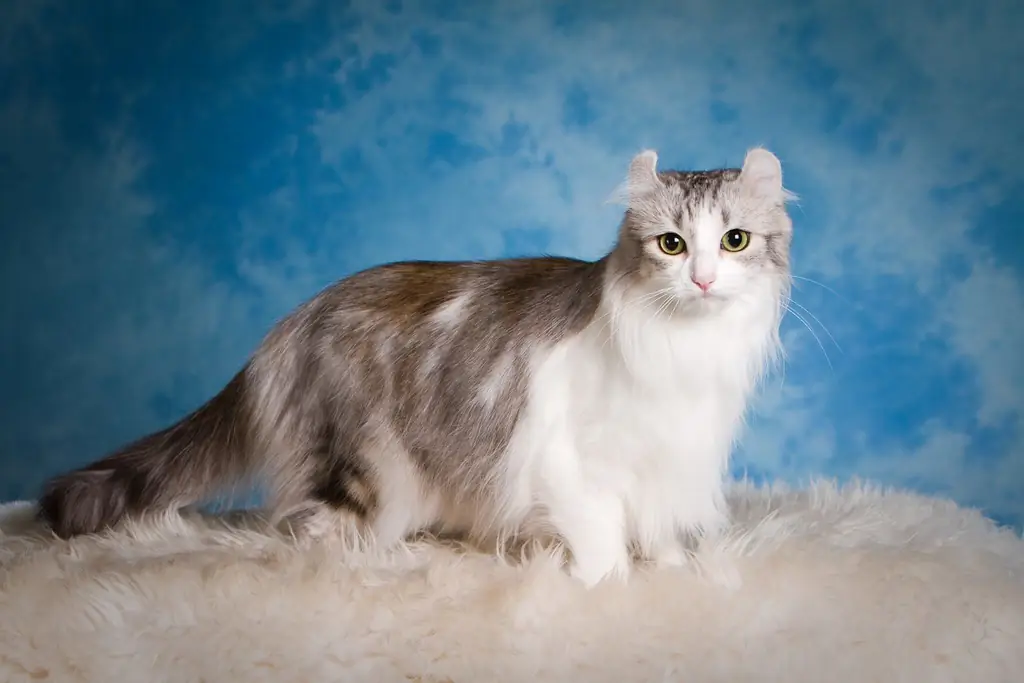
Table of contents:
- Author Bailey Albertson albertson@usefultipsdiy.com.
- Public 2024-01-17 22:26.
- Last modified 2025-01-23 12:41.
American curl: a cat with curled ears
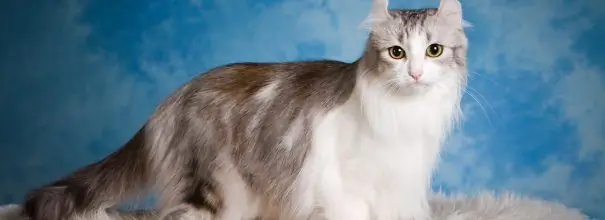
The American Curl is one of the best breeds for home keeping. These cats are ideally targeted not only to the owner, but also to the whole family. They have a sweet, docile disposition, good health and are extremely unpretentious in maintenance.
Content
- 1 History of the American breed
-
2 Features of the American Curl
-
2.1 External data
- 2.1.1 Photo Gallery: Various Colors of American Curls
- 2.1.2 Video: All About American Curl
-
2.2 Character and behavior
2.2.1 Video: Curl - Companion Cat
-
2.3 Breed faults
- 2.3.1 Propensity to disease
- 2.3.2 Disqualifying faults
-
-
3 Choosing a kitten
3.1 Video: Mom's tail is a great toy
-
4 How to care for an American Curl
-
4.1 Hygiene
4.1.1 Video: features of curl care
- 4.2 Nutrition
- 4.3 Toilet
- 4.4 Exercise
-
-
5 Breeding work
- 5.1 Nuances of breeding
- 5.2 Sterilization issues
- 6 Owner reviews
History of the American breed
The history of the American Curl is like a fairy tale - as, indeed, many stories of unusual cats of American origin. It all began in 1981 in the state of California, in the city of Lakewood. On a hot summer day, a happy accident brought two teenage kittens to the door of the Ruga couple's house. Grace, as she herself recalls, at that time was slightly ill and was lying in bed. Joe, her husband, entered the house and said that there were some cats sitting in the yard - they say, they would sit and leave.
But Grace felt sorry for the street children: they were probably hungry. The woman got up, filled the bowl with food and went out the door - there really were two very young cats, black and black and white. They eagerly pounced on the food, and then Grace was surprised to note how strange the little ears were - she had never seen anything like it before. Having persuaded her husband, the compassionate woman left the sisters to live with her, gave them names: black - Shulamith, black and white - Panda.
The Rugs did not have knowledge of genetics and felinology. They simply handed out unusual babies to their friends. But here fate again intervened in the history of the unique breed - this time in the person of an experienced breeder Nancy Keister. She became interested in exclusive cats and attracted enthusiasts to study their genetic characteristics and create a standard for a new breed, which got its name from the English word "curl" - "curl".
Features of the American Curl
Curl is an eternal kitten who does not want to become an adult and respectable, therefore he is called the feline Peter Pan. And he is also called a feline clown - for his ability to raise even the most nasty mood with funny games and antics.
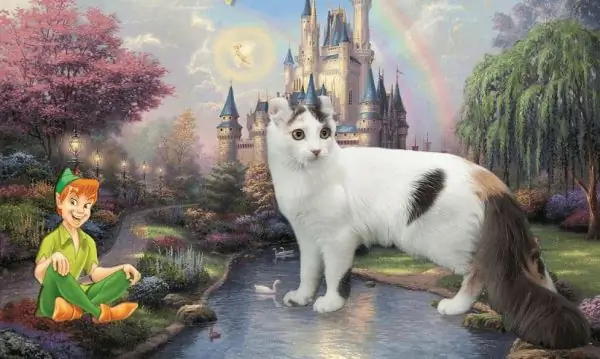
Curl doesn't want to grow up - like Peter Pan's fabulous eternal boy
External data
A medium sized cat, American Curls have a strong, harmonious, slightly elongated body. Females can be significantly smaller than males - if cats usually do not weigh more than five kilograms, then the average weight of an adult cat fluctuates around seven kilograms. In addition, the cat has a larger and wider head.
The muzzle has a regular wedge-shaped shape with pronounced cheeks and a soft transition from the forehead to the nose. The eyes are large, expressive and slightly slanted. Paws are low. The tail is long, well pubescent in long-haired curls.
A distinctive feature of the breed is its very special, bent back ears - in profile they resemble a crescent moon and thanks to them you cannot confuse the curl with any other cat. This curl is provided by rather hard cartilage, more similar to human ear cartilage than cats. The range of this unusual bend is from 90 to 180 degrees. The more the ears are curled, the more expensive the cat is.
The coat of the representatives of this unique breed can be either short or semi-long; it is so silky and pleasant to the touch that you can iron the curl endlessly - and he will only be glad of it. Correct coat quality is characterized by almost complete absence of undercoat throughout the body, including legs and tail.
The colors of these cats can be anything - like the colors of the eyes, however, the standard requires that one match the other. American curls are both short-haired and long-haired. In general, the possibilities for selection and experimentation in the breed are absolutely unlimited.
Photo gallery: American Curls of various colors
-

Curl red-white - Bright and elegant red and white curls are in great demand
-

Curl striped - Perhaps the jungle cat is listed in the distant ancestors of this curl.
-

Curl harlequin - Harlequin beauty - happiness in your home
-

Curl calico - Short-haired, tricolor calico - a common murka, if not for these ears
-

Curl color-point - Siamese colors are popular with curl owners
-

Curl black - Black cat with curled ears looks mystical
-

Curl tiger - "Forest, wild" colors are good in any breed
-

Curl bicolor - Contrast bicolor - striking black and white retro
-

Curl redhead - Ginger, as always, is irresistible and charming - and so are the curls
-

Curl lilac - Blurred lilac color adds sophistication to curl
-

Curl silver marble - A cat of “marble on silver” color is full of self-esteem
-

Curl cake - The color of each tortoiseshell cat is unique and inimitable
-

Curl white - White color is always a sign of tenderness and purity.
-

Curl peach - Delicate shades of peach are highly prized
-

Curl gray-white - The combination of gray and white is an elegant timeless classic
-

Curl van - The common color "van" has taken root in American curls
-

Curl gray - Blue tabby cat - cute cute
-

Curl golden marble - The marble-on-gold color looks luxurious and exotic
-

Curl smoky color - In active, active curls, smoky colors shine and shimmer
Video: all about the American curl
Character and behavior
These cats are unusually affectionate and playful, capable of turning absolutely any object into a toy. They perfectly converge with a person and treat him with adoration. Curls are very similar to dogs in their attachment to the owner and devotion to him. American Curls love to be in the spotlight, this is an ideal option for a large active family with children - eternal kittens will become their best companions in games and pranks.
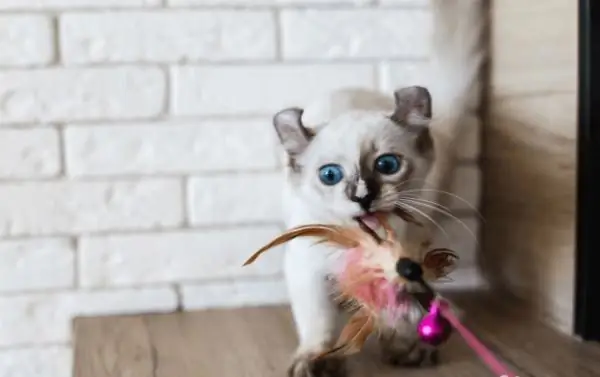
Curl is ready to play anytime, anywhere
Curls have no aggression at all - this fluffy lump of friendliness is always in a good mood and enjoys contact with people: both familiar and completely unfamiliar. And yet, the beloved owner for the curl is above all - this cat surprisingly recognizes the state of a person and feels his mood. Moreover, she will definitely try to help relieve stress: if necessary, she will caress, if not, she will quietly step aside or sit side by side. Loneliness is unbearable for a Curl.
The American Curl will not announce the house with a piercing meow, even during mating periods. But despite the fact that they meow little, the breed is considered very talkative - for the melodic purr, which is not heard except when your pet is sleeping.
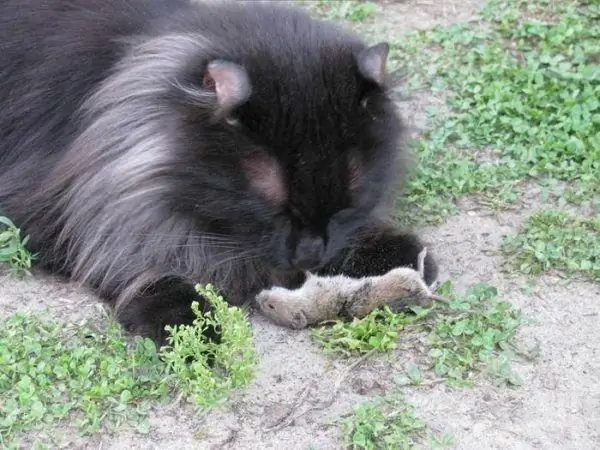
Curls have a highly developed hunting instinct.
If you have a curl, be prepared for the fact that this cat will not become a calm decoration of the sofa - her exuberant temperament will constantly demand an exit. It is no coincidence that they are called companion cats: this eared miracle is ready to constantly be near the owner, taking an interest in all his affairs. Curls easily adapt to the peculiarities of living conditions and easily fit into the usual rhythm of life of their new family.
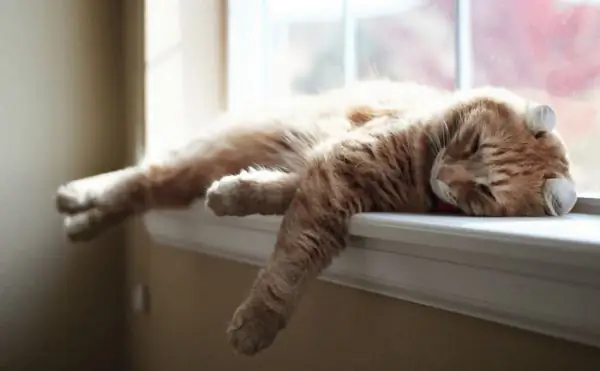
These cats are curious and even like to sleep on the windowsill.
Video: curl - companion cat
Breed defects
Curl owners are confident that their pets are perfect. And they are not far from the truth - the representatives of this rare breed have practically no flaws.
Disease propensity
The stormy past of the breed has provided its representatives with very good health. From their recent ancestors - outbred street cats - the American Curls got a strong immune system; they are healthy and hardy, they are not susceptible to practically any diseases.
At the initial stages of the existence of the breed, it was discovered, and mating with representatives of other breeds, and more often with outbred individuals, was practiced. In this way, breeders sought to breed the desired type of American curls and expanded their gene pool. At the same time, funny eared ears received a good heredity, not burdened with genetic diseases, as is the case in a small closed population. The gene that is responsible for the "curl" of the ears does not negatively affect the health of cats, since it manifested itself as a result of natural mutation.
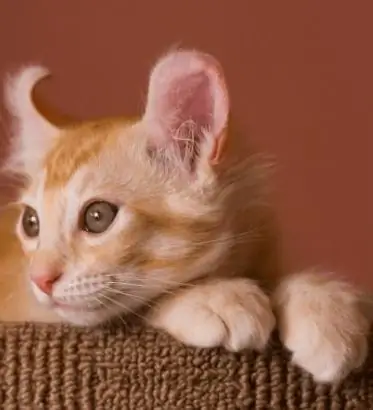
The famous curl ears are easily injured
Curls' breed pride - their bizarrely twisted ears - must be protected from injury and damage, because hard ear cartilage does not bend and is rather fragile.
Disqualifying vices
Disqualification of the American Curl at the exhibition can be caused by the same pathologies that are considered vices for other cat breeds: for example, cryptorchidism (undescended testicle) or incorrect development of the tail vertebrae (hall, fracture, etc.) - such animals are not only removed from the exhibition, but also withdrawn from breeding.
Purely breed shortcomings are primarily associated with the non-standard ears of American curls:
- asymmetry - uneven ear curl;
- insufficient or too large curl angle;
- inflexibility of the ear tips;
- irregular or very small auricle;
- lack or lack of hair on the inside of the ear.
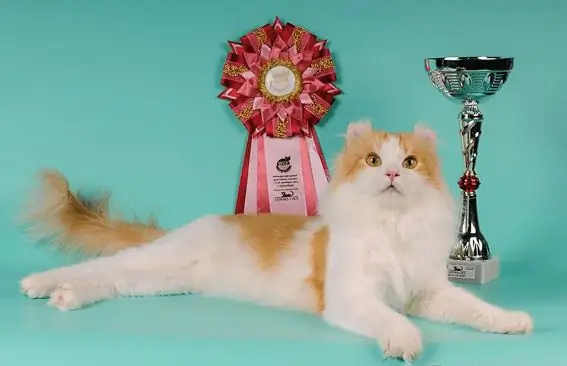
American curl - decoration of any exhibition
Choosing a kitten
Before adopting a kitten of this wonderful breed, weigh your options well. The fact is that a sociable curl does not tolerate loneliness: staying alone for a long time at home, he will soon begin to yearn and may even get seriously ill. It is better not to have such a pet if you cannot provide him with constant communication with a person.
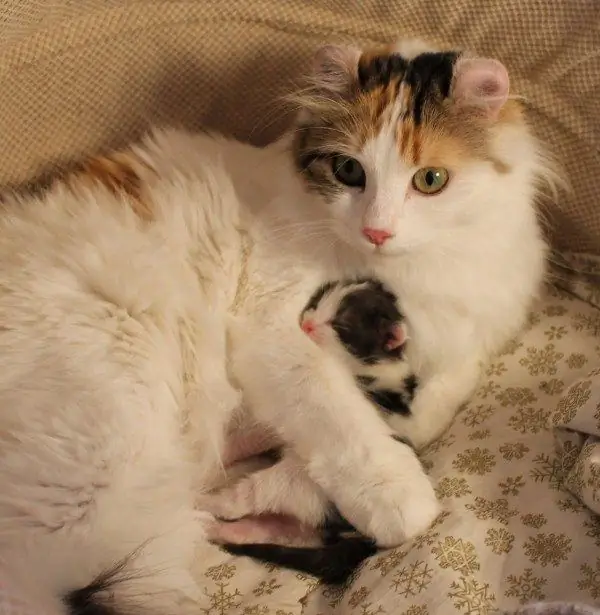
A newborn curl has straight ears, like a normal kitten
While the baby is growing, his ears - "horns" behave unpredictably: they twist, then suddenly straighten. Therefore, curl breeders sell their pupils later than most other breeders. The ear cartilage must be fully formed - after all, not only its purely monetary value, but also its breed value depends on what the American curl's ear will become.
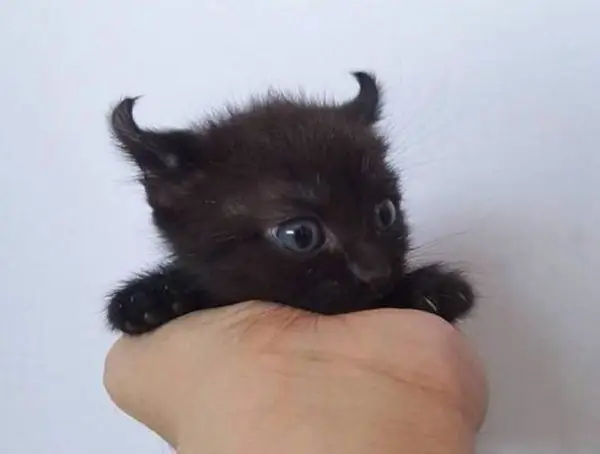
Curl baby - adorable creature with twisted ears
There are many obvious advantages for the buyer in purchasing a grown-up kitten over four months old. By this time, the animal has passed both full vaccination and quarantine, which means that without health risks it can move to a new place of residence and contact there with any other pets, if any.
When you buy a kitten in a professional cattery - and only there you need to buy an American Curl - you can be sure that he is fully socialized and accustomed to all the nuances of a problem-free family life. In addition, the breeder will already be able to tell you a lot about the behavior, character and addictions of this wonderful eared eared.
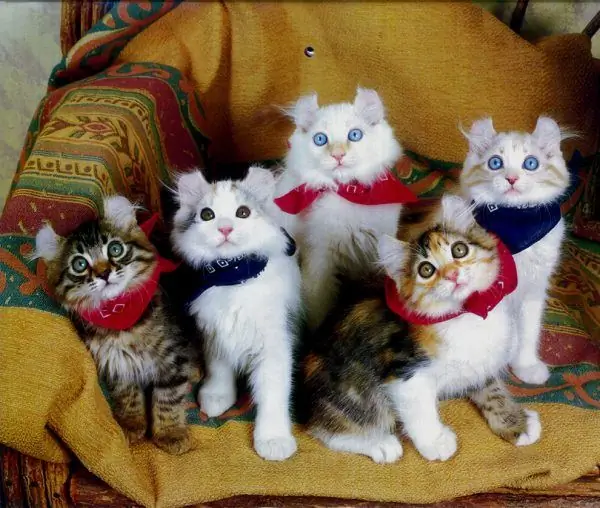
Each litter of curls has colors for every taste
Curl is also good because, unlike many other breeds, here swindlers will not be able to deceive you. The main breed characteristic is visible to the naked eye, even to an amateur: the ears are either twisted or not - there is no third option. However, beware of spontaneous online purchases of curls, pet stores, and even more so - in poultry markets. The biggest risk of such an acquisition is that you can get a sick animal with all sorts of sad consequences arising from this fact. And of course, selling a kitten as a "show class", no one can guarantee you anything.
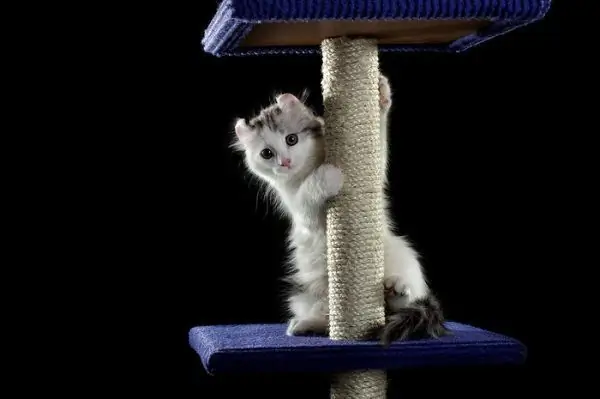
Give your pet as much attention as possible
The breeder is always interested in the future of his kitten. Therefore, as a bonus, you will also receive a lot of really valuable advice, and ideally long-term help: advice on growing, treating and caring for your wonderful curl. The main thing that is required of you is love, attention and care.
Video: mom's tail is a great toy
How to care for an American Curl
Care requirements for American Curls are minimal - this elite breed is extremely simple and unpretentious in keeping. So much so that even a novice cat lover can handle it.
Hygiene
Of course, you will need to regularly comb out their beautiful fur coat, especially for long-haired curls. You need to bathe them as soon as they become dirty or once every two to three months. Playful curls turn even the washing process into fun fun - they like to catch streams of water, play with splashes.
The silky, almost free from fluffy undercoat of the American Curl does not form tangles and does not get lost in felt, which often happens in other long-haired breeds. Usually one brushing per week is enough to keep the coat in good condition. When the cat sheds, you will, of course, have to comb it out more often. For these periods, in addition to the slicker, you will also need a good furminator - with it, the procedure for getting rid of dead wool will be faster and more efficient.
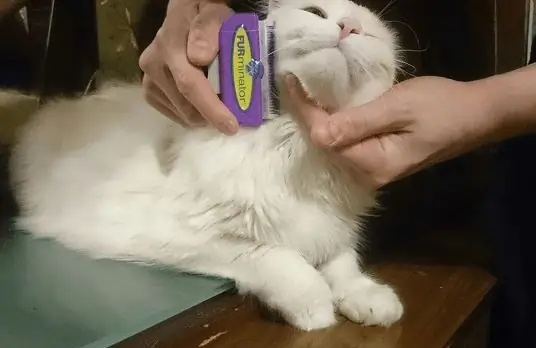
Furminator should only be used during the moulting period of the American Curl.
If the curl walks a lot, then its claws are grinded off naturally; a good scratching post can also help with this issue. In all other cases, the grown claws must be trimmed from time to time - about once a month. Your pet's eyes and teeth also require regular hygiene. It is enough for a healthy cat to wipe his eyes daily with a napkin dipped in boiled water. If you have a heavy discharge, you should see your veterinarian to decide on a treatment or a more effective care product.
The situation is the same with the dental system: root plaque on the teeth and bad breath in a cat can indicate both an improperly selected diet and chronic internal diseases, for example, problems with the gastrointestinal tract. The cause requires identification and elimination, but teeth should be cleaned anyway. To do this, it is worth purchasing a special - not human - toothbrush and toothpaste.
Curl ears, of course, deserve special attention. They must be examined carefully at least once every two weeks. In the presence of contamination, gently clean with a cloth or cotton pad and warm water. It is undesirable to use a cotton swab, as it is not recommended to try to deeply clean the auricle. If the ear turns red, becomes hot, or an unpleasant odor appears, this is a signal for urgent medical attention.
Video: features of curl care
Food
Curls love to eat a lot and tasty, but at the same time they are by no means spoiled gourmets and with the same enthusiasm consume both ready-made dry food and canned food, and natural food. Usually, breeders recommend keeping representatives of this breed on super-premium ready-made feeds, and these advice should be heeded. After all, you are buying an already grown-up kitten, which is accustomed to specific types of food, and its fermentation was formed in a certain way.
By itself, moving to a new family is stressful for any animal, and should not be aggravated by an abrupt change in diet. Even if you are a convinced adherent of natural nutrition, transfer your pet to it smoothly and gradually, starting with the types of food that are familiar to him. The natural diet of the American Curl should be varied, but not too high in calories. What can be included in its menu:
- chicken breasts;
- lean red meat - preferably veal;
- offal;
- boiled sea fish;
- skim cheese;
- eggs are better than quail;
- well-boiled rice or buckwheat porridge - in small quantities;
- vegetables and fruits - except citrus and grapes.
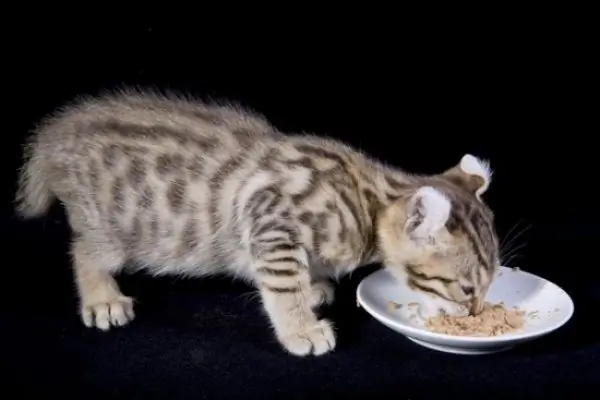
A balanced diet is very important for a curl
What is not allowed:
- milk and cream;
- any legumes;
- dried fruits and citruses;
- fatty, spicy and fried foods;
- sweets and confectionery;
- fresh yeast baked goods;
- "Tasty treats" from the master's table.
Restroom
Ask the breeder what type of tray your pet was accustomed to and what type of litter he used. Toilet is a delicate matter, and it will be better if your little newcomer does not have any drastic changes in this matter.
In general, it is more preferable to have a closed or at least with high sides a tray that is quite spacious. Having mastered a new place, the fidget curl will begin to show his playful disposition in the most unexpected places - even in the toilet. A cramped open tray is guaranteed piles of rubbish on the floor next to it, or even throughout the house.
Exercise
Be sure to purchase a comfortable harness for your pet and start teaching him to walk on a leash as early as possible. Walking for these cats is both pleasure and great benefit.
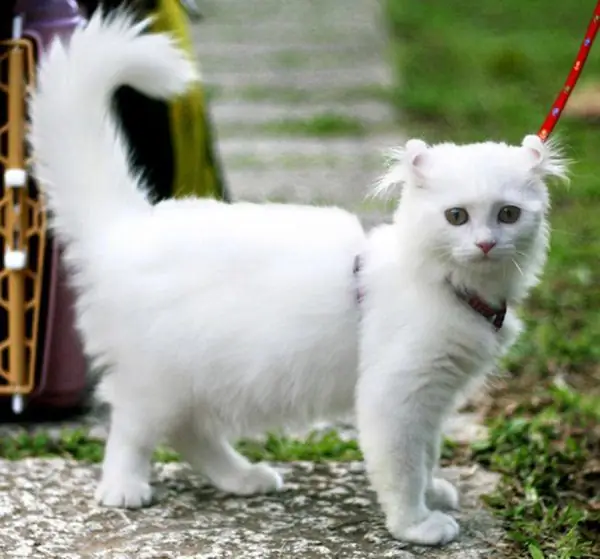
Curls willingly walk on a leash and even carry out the command: "Near!"
Take your pet for a walk at least twice a week in any weather. But do not risk letting him off the leash - carried away by something interesting for him, the curl can run away, and it will take a very long time to look for him.
Tribal work
The small number of the young breed is explained not only by its high cost, but also by certain difficulties in breeding, which are usually beyond the power of an ordinary amateur to cope with.
Breeding nuances
The main difficulty of breeding work with American Curls is the limited breed gene pool - it is very difficult to find a matching pair for your pet. So if you are going to engage in serious breeding work in this breed, tune in to long, long and expensive trips in search of the best groom for your cat.
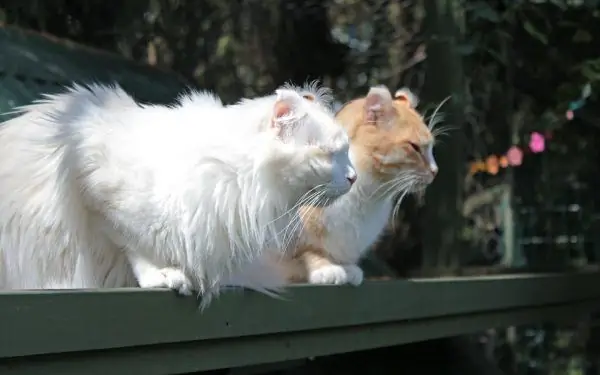
The selection of a parental pair is an important stage in breeding
The mother-to-be usually bears well and gives birth to children easily. In due time, after about seventy days of pregnancy, the long-awaited curls are born - the litters of this breed are not too large, they contain from three to five kittens. Mom is very thoroughly involved in their upbringing - the parental instinct of American Curls is highly developed.
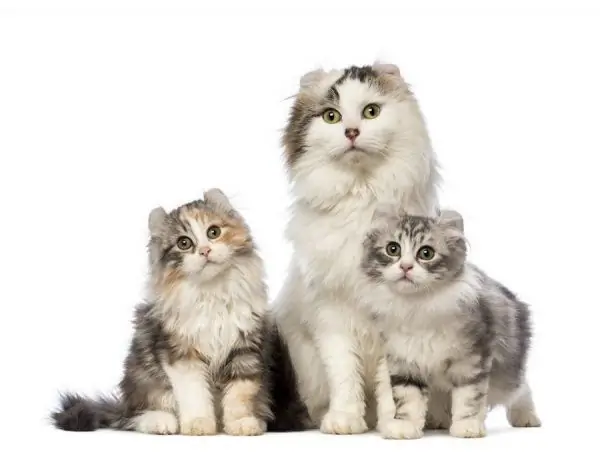
Maternal instinct in curls is highly developed
But when the children reach the age of four months and begin to disperse to new homes, the acuteness of maternal feelings subsides - the cat's hormonal background levels off, she is again ready for mating and childbirth. Of course, none of the breeders practices such frequent mating: the cat must fully recover. She should give birth to kittens no more often than three times over the course of two years.
Sterilization issues
Taking care of the quality of the breed, American Curl breeders practice mandatory neutering or neutering of pet-class kittens, making this rule a sine qua non of the sale. The procedure for castration or sterilization should be carried out approximately at the age of one to one and a half years - this is the optimal time for surgical intervention in the reproductive sphere of an animal that is already quite physically mature, but has not yet mated. Such operations must be done in a veterinary clinic, and not at home. The rehabilitation process is also very important - it should also be supervised by experienced veterinarians.
Owner reviews
The unusual beauty, high intelligence and wonderful character of the American Curls make this young breed very interesting and attractive for true cat lovers. But so far, curls remain very rare, which is largely due to the limited breed gene pool and the high cost of animals.
Recommended:
Russian Blue Cat: Description Of The Breed, Photos, Features Of Care And Maintenance, Breeding Cats, Choosing A Kitten, Owner Reviews
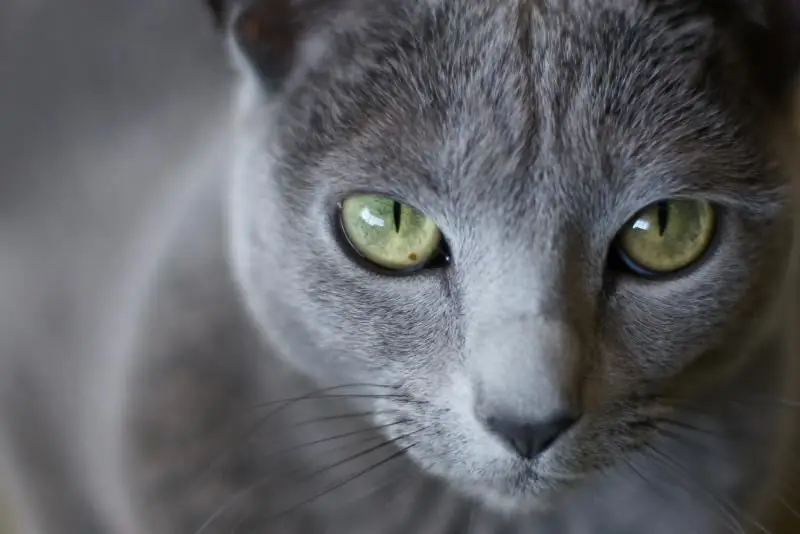
Everything you need to know about the Russian blue cat: the history of the formation of the breed, characteristics, behavioral features, rules for the care and breeding of animals
Bombay Cat: Cat Photo, Price, Breed Character, External Standards, Breeding, Kitten Selection, Owner Reviews
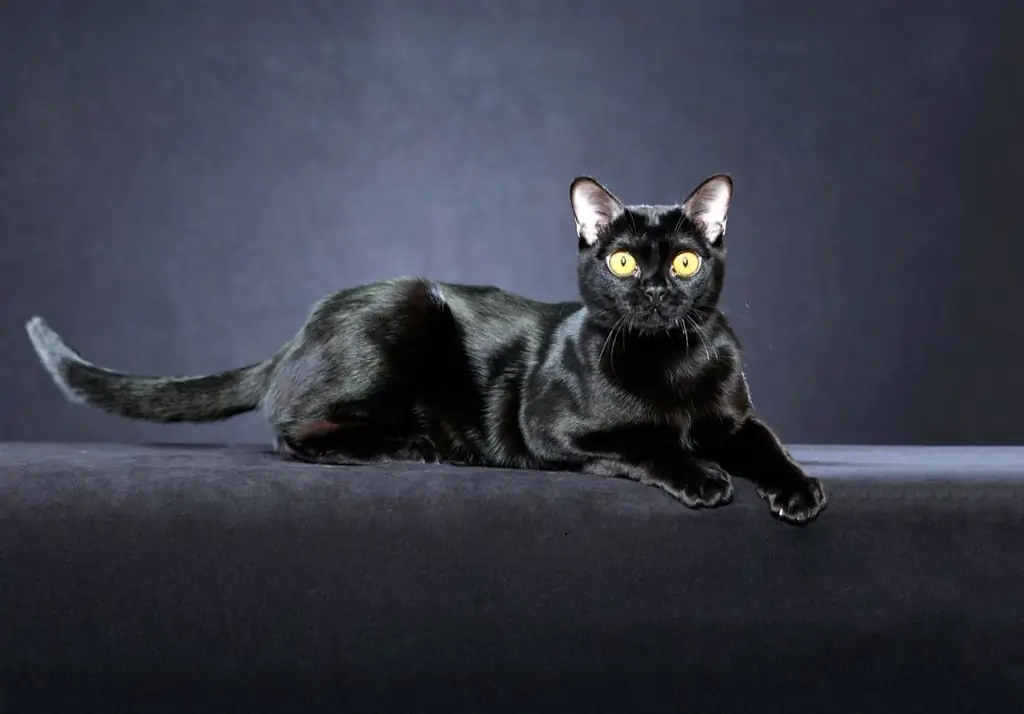
Where is the Bombay cat bred, what are the main external differences and character, how to properly care for it, feed it, how to choose a kitten of this breed
Anatolian Cat: Features Of The Breed's Appearance, Care And Maintenance Of The Cat, Character And Habits, Breeding Pets, Owner Reviews
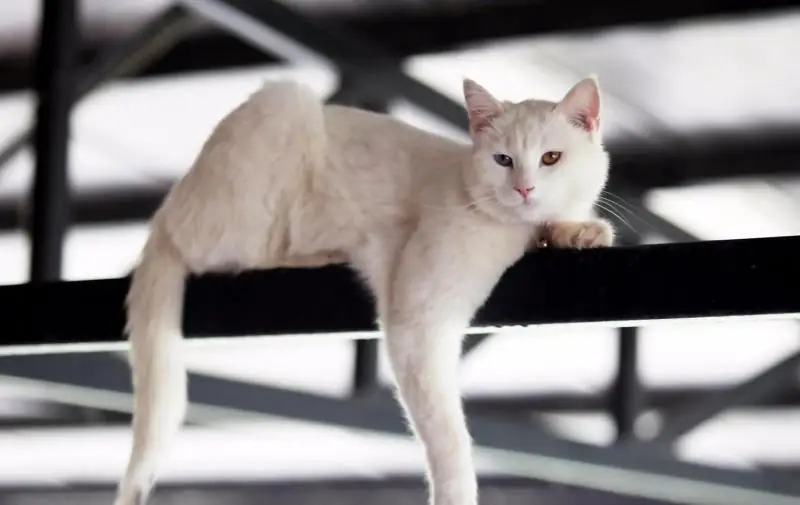
Where the Anatolian breed is bred. The main external differences, the nature of the pet. How to properly care for him, feed him. How to choose a kitten. Breeding. Reviews
Black British: Features Of The Breed, Character And Care Of The Cat, Photos, Choice Of A Kitten, Reviews Of The Owners Of The British Cat
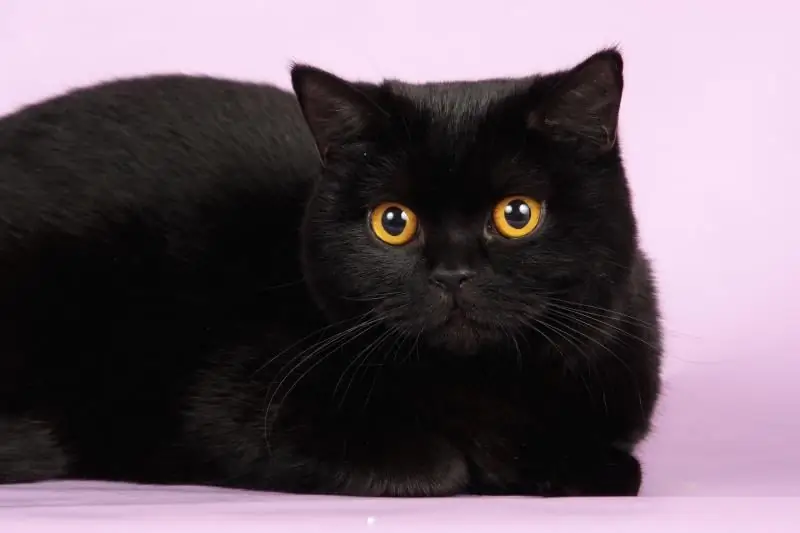
Where is the breed bred, what are its main differences, what character does a black Briton have, how to properly care for him, feed him, how to choose a kitten
British Fold Cat: Breed Features, Description Of The Character And Behavior Of The British, Photos, Choice Of A Kitten, Owner Reviews

History of the British Fold. Description of appearance and character. Diseases of the breed. The choice of the Fold Briton. Maintenance and feeding of British Folds. Breeding
